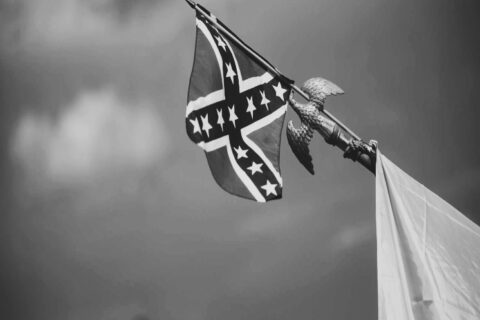As a former liberal, conservative, and libertarian and, for years, a “behind the scenes” political activist, I am happy to say that I have now freed myself from politics and voting. It’s one of the most beneficial choices I’ve ever made!
I used to spend endless hours watching and reading my preferred political sources, mining information I could use to better argue with others I hoped to evangelize to my team, only to realize each election that it had all been for nothing. Things would turn out the same whether I spent 24/7 on politics or did nothing. And no matter what I did, I never had the people in power I desired. I was told voting was my voice, but it seemed no one would listen. I was frustrated, exhausted, anxious, angry, depressed, and more due to my involvement in politics.
Transformation –The Old
Perhaps it began while I was a teenager. I remember watching the elections on the news, seeing everyone, win or lose, “come together” and celebrate democracy after each election and being enthralled by the peaceful change of power, as if the only other option was war. What stuck out to me most was the losing side praising democracy and shrugging off the loss of the election. The side that just spent four years bashing the other as evil was now calmly accepting their victory and control over them. They then had the audacity to claim this was self-government simply because people participated in an election that did not produce the government they desired. In fact, even had their side won, it would often only amount to the lesser of two evils.
I never understood how, just because one team achieved more votes, that justified them ruling over the minority party. Was it not political (and military) numerical superiority that led to many forms of evil in the past? Why do we keep handing majorities the reins of government? It seems to ask for more persecution of minorities. In other words, under democracy, there must always be a victim, and we are placed at war with each other, fighting to deny the other their own government of choice. nineteenth-century libertarian and abolitionist Lysander Spooner correctly observed:
[Under Democracy], a man finds himself environed by a government that he cannot resist; a government that forces him to pay money, render service, and forego the exercise of many of his natural rights, under peril of weighty punishments. He sees, too, that other men practice this tyranny over him by the use of the ballot. He sees further that, if he will but use the ballot himself, he has some chance of relieving himself from this tyranny of others, by subjecting them to his own. In short, he finds himself, without his consent, so situated that, if he use the ballot, he may become a master; if he does not use it, he must become a slave. And he has no other alternative than these two.
The New
Spooner’s last two sentences offer a grim choice, but I have dug into some concerning data that has nevertheless pushed me out of politics in recent years. Studies verified at numerous universities over decades corroborate these facts (and much more). Politics is degrading to the mind. When politics are injected into our thought process, we can no longer handle information and evaluate it unbiasedly; this occurs whether you are on the Right or Left. Our most common fallacy is confirmation bias, which hinders us from challenging our own views. We only watch media, read newspapers and books, listen to podcasts, etc., that tell us what we desire to hear. Studies revealed that we receive pleasure responses in the brain similar to caffeine or nicotine while watching our preferred news sources as they demonize the “other” group and justify our own; it becomes an addiction for many.
When we are presented with data that conflicts with our predetermined position, we reinterpret or dismiss it. Media are selling products, and people want only their views confirmed, so we separate into various groups and dehumanize those outside of us, enter tribal good vs evil thinking, and blame life ills on “those people,” the other groups. Politics divides families, churches, and entire nations. The injection of politics has increased wars, crime and the persecution of minorities wherever it has been introduced. It increases anger, stress, and hatred among citizens. Professor Jason Brennan wrote that the majority of regular voters:
…consume political information, although in a biased way. They tend to seek out information that confirms their preexisting political opinions but ignore, evade, and reject out of hand evidence that contradicts or disconfirms their preexisting opinions… cherry-pick data and tend only to learn about research that supports their own views… Their political opinions are part of their identity, and they are proud to be a member of their political team. For them, belonging to the Democrats or Republicans… matters to their self-image in the same way being a Christian or Muslim matters to religious people’s self-image. They tend to despise people who disagree with them, holding that people with alternative worldviews are stupid, evil, selfish, or at best, deeply misguided. Most regular voters, active political participants, activists, registered party members, and politicians [fulfill this description].”
Other studies demonstrate that typical voters are nearly oblivious to what is occurring and what they are voting for; they often vote against the very thing they desire! Trivial events occurring at or near the time of the elections, such as the success of local sports teams, often influence how we vote, not logical reasoning. Instead, most voters identify with a group or a political party due to emotional ties and how they choose to self-identify.
Liberation
You have a greater chance of winning the Powerball three times in a row than of your vote changing the outcome of an election, state, federal, or local. Instead of this fact depressing me, it had a liberating effect. It meant I did not have to spend all my time and energy on something that would not produce any positive outcome.
Removing myself from politics helped free up time and energy, lowered anxiety and stress, helped me be less judgmental and allowed me to think more logically. I no longer have to conform my thoughts and opinions to what a chosen “group” and its outlets tell me to; I can now think for myself. No longer must I be at war with half the country, nor despise them or think them ignorant for disagreeing with me.
So, what do I do with all the time I previously spent yelling at the television and obsessing about politics? I spend it with family, I work out, and I am in much better shape. This has boosted my self-esteem and reduced stress. I am also far less angry and anxious; Doomsday is not coming next election despite what fear-mongering politicians and news channels tell me. I could pick fishing or gardening back up, and I can read for enjoyment! One thing I won’t be doing is voting or attempting to force my way on others; instead, I will follow the golden rule and treat others the way I want them to treat me. I do not want others to use government coercion and power to force me to do what I don’t desire or support what I would otherwise not, and even though they will continue to do that, from now on I choose to turn the other cheek and not repay evil for evil.
-By Jeb Smith
Jeb Smith is the author of four books to date, the most recent being Missing Monarchy: Correcting Misconceptions About The Middle Ages, Medieval Kingship, Democracy, And Liberty. Before that, he wrote and published Middle-earth Lore: Tolkien’s Legends Revealed and another book on J.R.R. Tolkien’s works. Smith has authored multiple articles on various blogs and websites, including History is Now Magazine and Medieval History.

O I’m a good old rebel, now that’s just what I am. For this “fair land of freedom” I do not care at all. I’m glad I fit against it, I only wish we’d won, And I don’t want no pardon for anything I done.






Thank you. I have felt deeply convicted on some of these points. It’s helpful to see them laid out like this.
You are most welcome.
Yet, I still vote, using the “write-in” option, usually for NOTA – None Of The Above.
I used to vote libertarian just to symbolically give the middle finger to the major parties.
I agree.
To add to it though, if you still carry the itch to bring about change – get to know the people in your community as best you can (just don’t be obnoxious about it). No law against having short meetups where you help your race – ie with gaining employment, education, finance and basically everything the jews do today.
Perceptive article. Thanks!